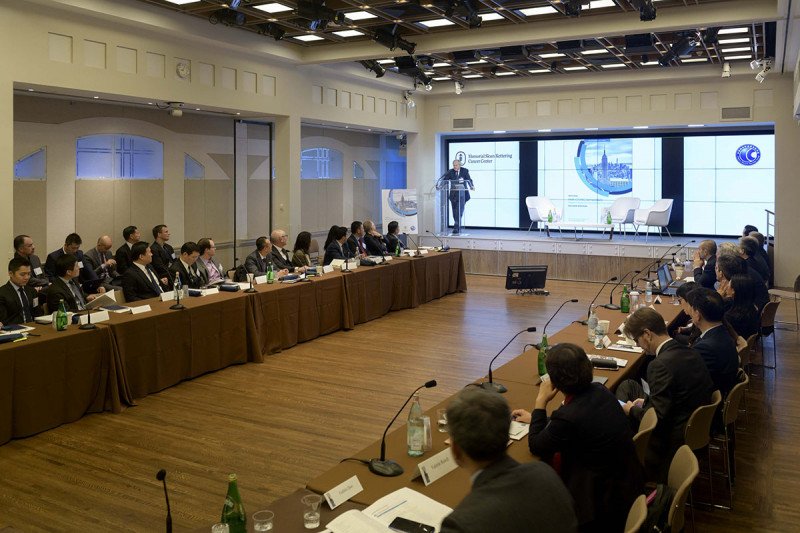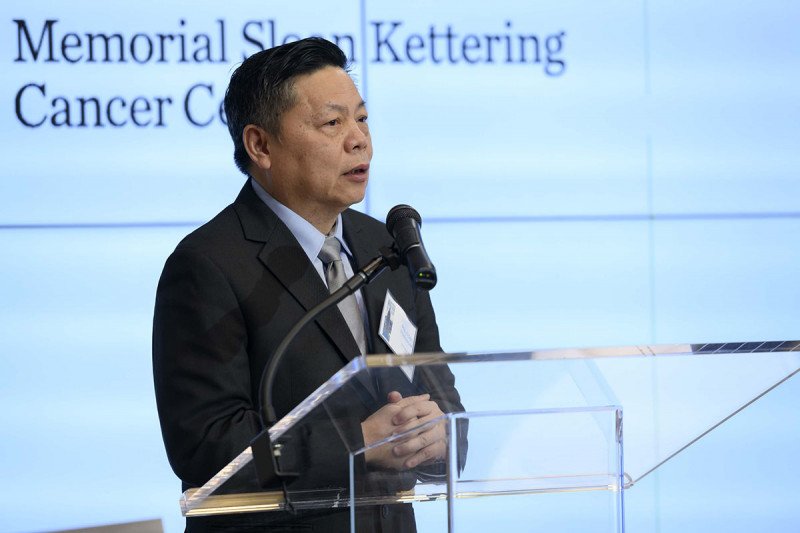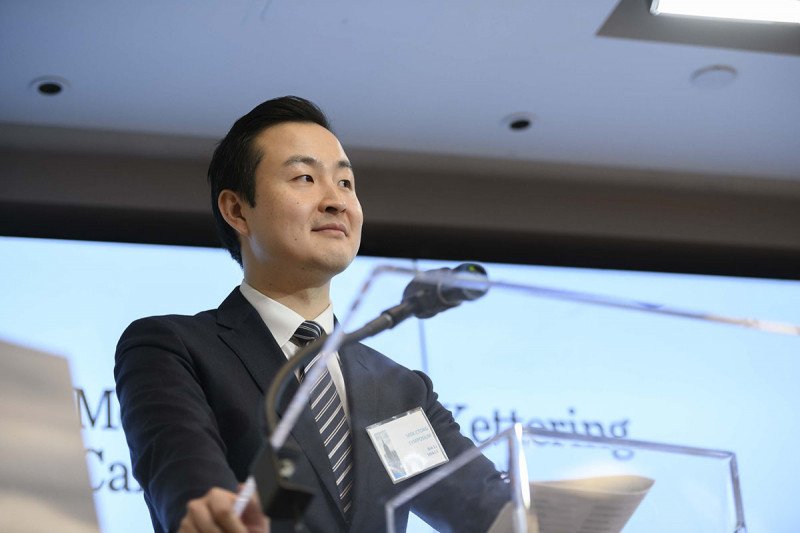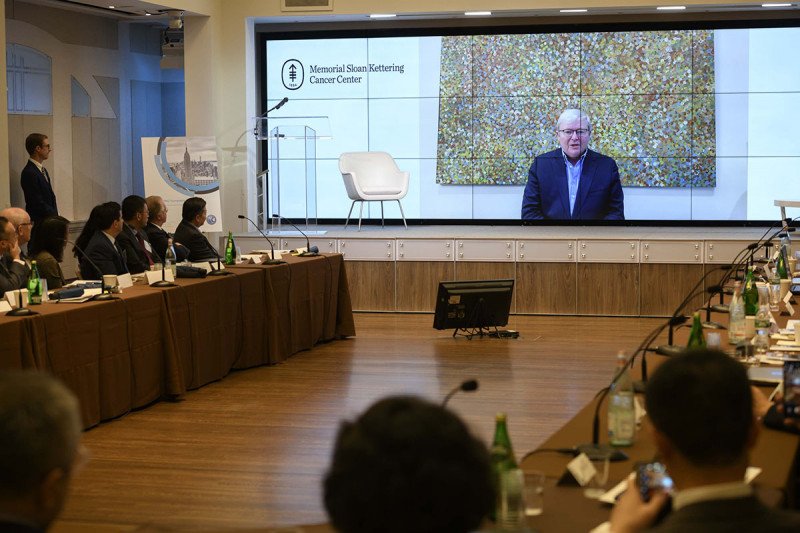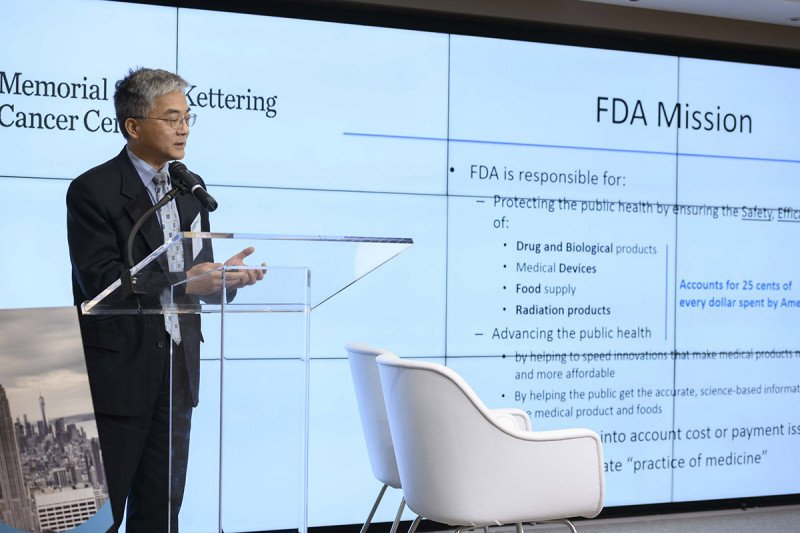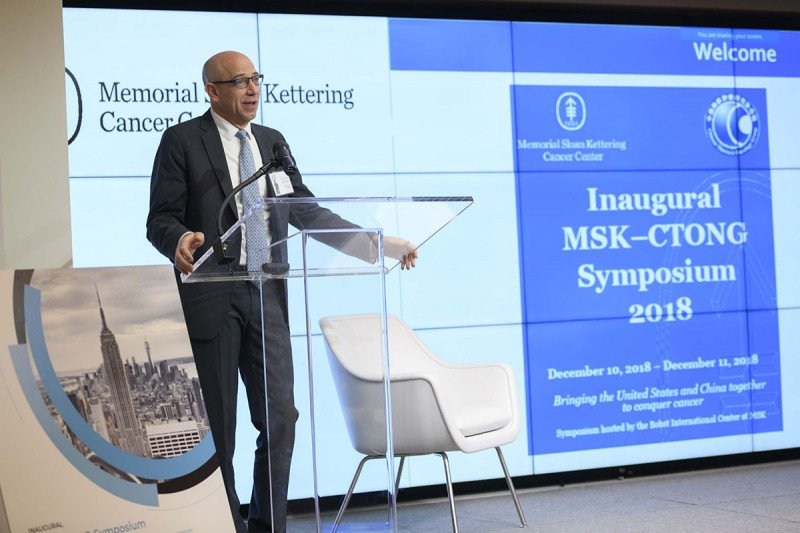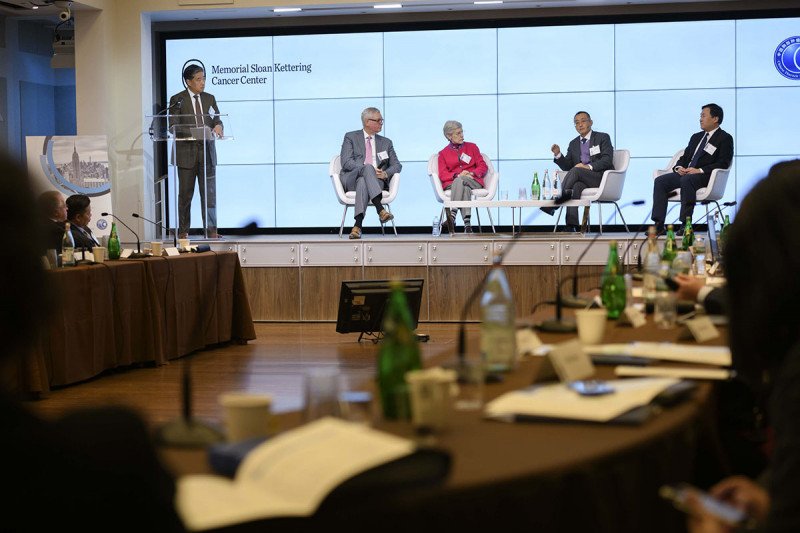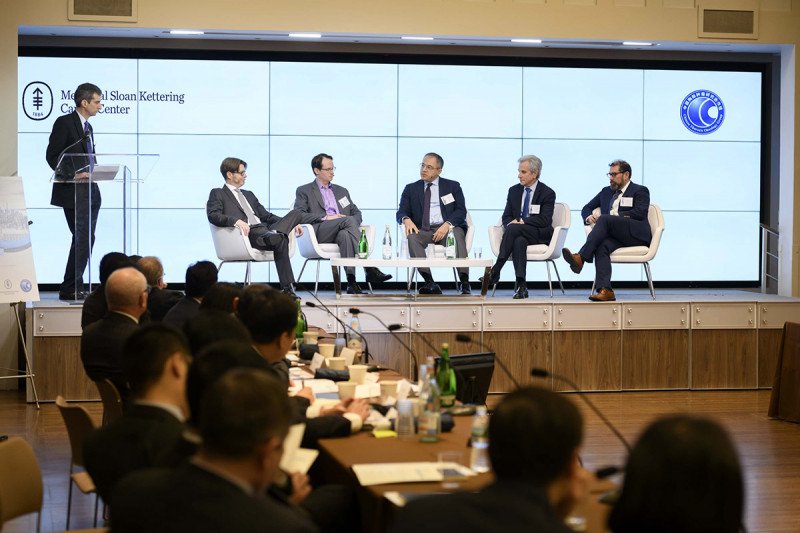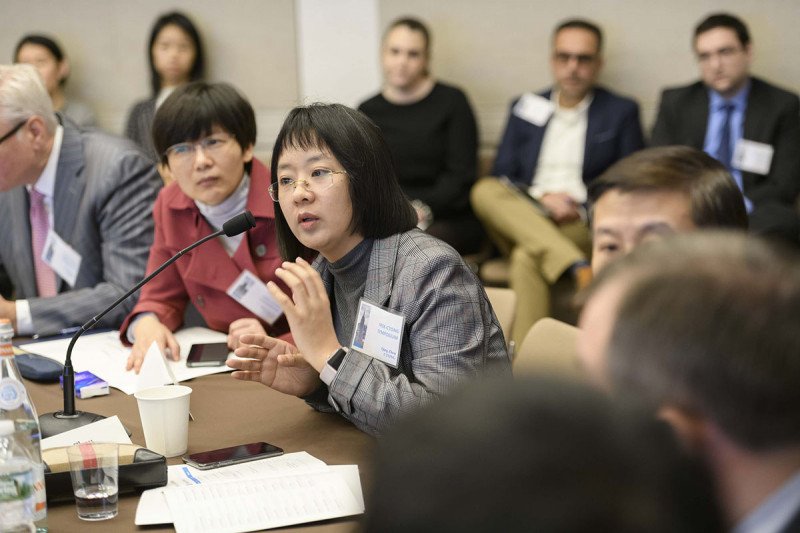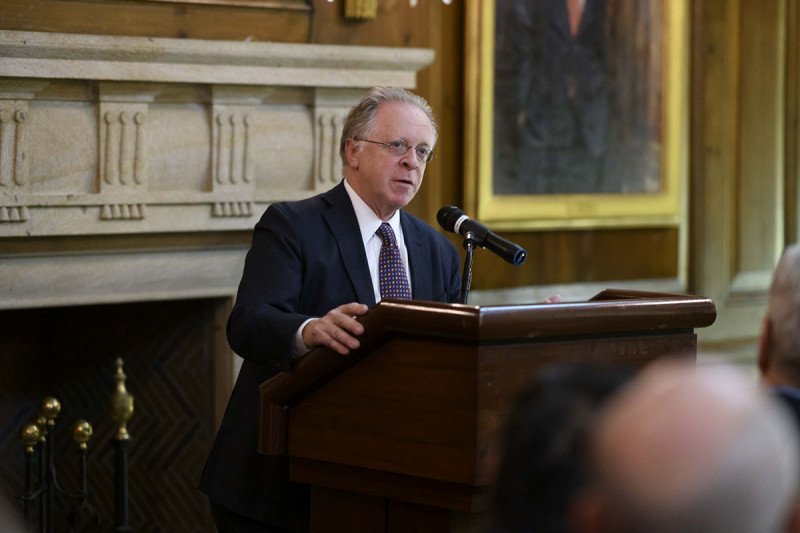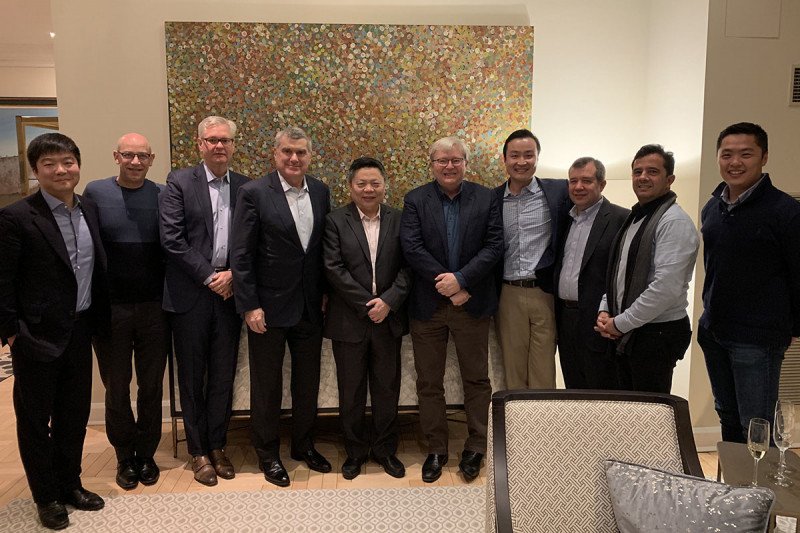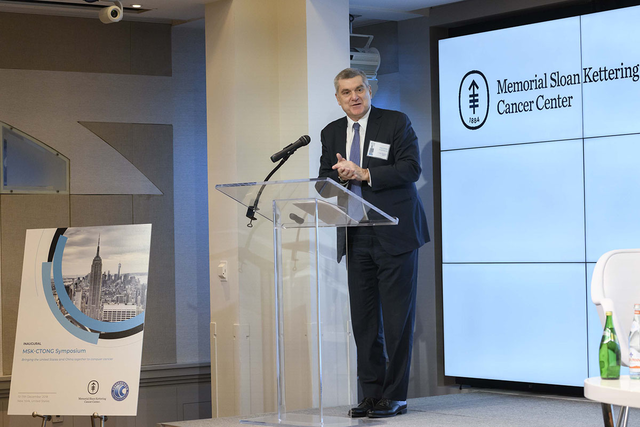
MSK President Craig Thompson speaking at a symposium that brought together cancer experts from the United States and China.
In a first-of-its-kind collaboration, Memorial Sloan Kettering has joined forces with the Chinese Thoracic Oncology Group (CTONG) — an alliance of more than 20 premier academic cancer centers in China — in an effort to establish a program of clinical trials that are open to patients from both the United States and China. The initiative will focus on clinical trials of precision cancer therapies for lung cancer, the number-one cause of cancer deaths in both nations.
The collaboration, formalized in December, is designed to build the academic foundation for multicenter US-China clinical trials, with the ultimate goal of boosting enrollment in clinical trials so that effective new therapies can be approved faster. Other distinctive aspects of the partnership include telemedicine and educational initiatives to improve patient care in both countries as well as efforts to foster industry participation. For help in navigating this new terrain, MSK and CTONG have engaged regulators from the US Food and Drug Administration (FDA) and the China National Medical Products Administration (CNMPA) as well as leaders from the Australasian Lung Cancer Trials Group (ALTG) and the New York–based Asia Society Policy Institute (ASPI) for policy advisory support.
“Although we are making great strides in the treatment of lung cancer, there’s more we must do to advance care for people on a global scale,” says Sir Murray Brennan, Senior Vice President of International Programs at MSK. “This new partnership gives us an opportunity to speed the approval process for lifesaving therapies with benefits that may have ripple effects worldwide.”
“We are truly honored to collaborate with Memorial Sloan Kettering on this exciting initiative,” says surgical oncologist Yi-Long Wu, President of CTONG and Lifetime Director and former Vice President of Guangdong General Hospital, in Guangzhou, China. “Nearly 781,000 people are diagnosed with lung cancer every year in China, with a similarly high death toll. This initiative gives us a powerful ally by accelerating the development of new therapies and prevention strategies against a common enemy.”
A Collaboration Enabled by a New Regulatory Environment in China
The MSK-CTONG collaboration has come on the heels of regulatory changes instituted in China in 2018 to fast-track the availability of new drugs from the United States and elsewhere. Previously, the approval process for therapies proven in clinical trials outside of China could take many years, often requiring Chinese clinicians to repeat entire trials in the Chinese population.
The new regulations allow for the use of clinical data from outside of China, helping shrink approval times to 60 days or less. The rules also open the door to having Chinese investigators participate in clinical research with American counterparts.
“The new regulatory environment places China on the same footing as the rest of the world,” says Bob Li, a medical oncologist who specializes in lung cancer and was recently appointed MSK’s Physician Ambassador to China and Asia-Pacific. “For the first time, we can work together to develop new therapies for simultaneous regulatory approval in the US and China through multicenter clinical trials. And we can do it at a much faster pace through the scale of the Chinese population. Our hope is that this collaboration will advance new cures for people in both countries and across the rest of the world. But to clear the initial hurdles, we’re going to need collaborators from the government, industry, advocacy groups, and the policy community.”
“Bringing the US and China together to conquer cancer is a timely and noble cause and a first-class example of common ground and cooperation between the US and China,” says the Honorable Kevin Rudd, who served as Australia’s 26th Prime Minister and is now the President of ASPI. “It is crucial to address the policy dimensions of US-China cooperation on tackling diseases — from regulatory issues to clinical trial protocols to intellectual property protections and beyond — in order to unleash the full potential of this initiative.”
A Focus on Precision Medicine and Lung Cancer
Together, the United States and China account for more than half of the 2 million lung cancer diagnoses made worldwide each year. Precision medicine, an area of particular promise for lung cancer, is the basis of the MSK-CTONG collaboration.
Precision cancer medicine, also called precision oncology, involves the development of drugs that target genetic or proteomic changes in cancer cells, the tumor microenvironment, and a patient’s immune system. Such targeted therapies may provide more-effective control of the disease with fewer side effects than traditional drugs. However, there are challenges in developing such personalized approaches.
One of those challenges concerns enrollment in clinical trials. In particular, it can take time to identify enough participants with a specific mutational profile so that a trial can move forward.
“MSK is a world leader in precision medicine,” says Dr. Li. “But we’re not always able to move things forward as quickly as we’d like. Considering China’s vast population, the MSK-CTONG collaboration will be able to accelerate the enrollment process, so that we can exponentially scale precision cancer research.”
“This is an area where China can benefit from MSK due to its global leadership in precision medicine and early-phase clinical trials,” says Dr. Wu. “China can contribute through the quality and size of CTONG to make the large-scale development of precision medicine possible in the US.”
Laying the Groundwork for the First Clinical Trial
The groundwork for the first US-China clinical trial was laid in December when a multidisciplinary group of leaders from MSK, CTONG, the FDA, the CNMPA, ALTG, and ASPI convened in New York that month for a two-day symposium.
The event brought together leading medical oncologists, surgeons, radiation oncologists, pathologists, laboratory scientists, nurses, and clinical pharmacists as well as members of the pharmaceutical and biotechnology industries. Prime Minister Rudd delivered the keynote address in both English and Mandarin. Panel discussions covered such topics as immunotherapy, liquid biopsy, drug development, biomarkers, and translational research.
Next steps include establishing an MSK-CTONG Clinical Trials Policy Task Force in partnership with ASPI to facilitate ongoing dialog with government regulators and the business community. Drs. Li and Wu expect to share their findings in scientific publications later this year. The first clinical trial to be offered through the collaboration may begin enrolling patients in China toward the end of 2019.
